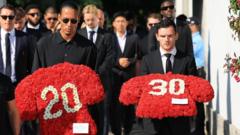The funeral of former President Edgar Lungu has become a battleground for the ongoing feud with incumbent President Hakainde Hichilema. The late president's family expressed a wish for Hichilema to stay away, highlighting the animosity that has persisted since their electoral clashes. Despite an initial plan for a state funeral, tensions have delayed arrangements, reflecting the unresolved conflicts that have impacted the country's political climate.
The Political Divisiveness of a Presidential Funeral in Zambia

The Political Divisiveness of a Presidential Funeral in Zambia
The rivalry between Zambia's President Hakainde Hichilema and former President Edgar Lungu intensifies even after death, complicating funeral arrangements and deepening national divisions.
With funeral arrangements causing a stir in Zambia, one might think that the passing of a former leader could foster unity. Instead, the collision of politics and mourning has exposed the deep fractures within the nation, particularly between President Hakainde Hichilema and his predecessor Edgar Lungu, who passed away recently.
Lungu's family revealed that one of his last wishes was for Hichilema to avoid attending the funeral. This wish has sparked a debate over honoring the former head of state while navigating a longstanding and publicly contentious rivalry between the two leaders. The present leader and Lungu faced off in elections, with Hichilema eventually emerging victorious in 2021 after a close electoral history.
The complications began with the announcement of Lungu's death on June 5. His daughter, Tasila Lungu, broke the news via a Facebook video that called for unity, suggesting that tensions were in play despite the expected mourning period. The absence of an immediate acknowledgment from Hichilema, who eventually offered condolences hours later, raised eyebrows and concerns among Lungu's supporters; they deemed his words insincere.
This discord traces back to Hichilema's treason arrest in 2017, during which he spent over a hundred days in detention. His experience remained a significant grievance against Lungu, leading to continued political rivalries even after elections. Following his electoral defeat, Lungu had faded from the political limelight but, sensing discontent with Hichilema's presidency due to economic issues, he aimed for a political comeback.
Further exacerbating the situation, Lungu's return to active politics led the government to rescind his retirement benefits, further igniting tensions. He faced strict police scrutiny and alleged harassment, including being warned against his routine jogging, which authorities labeled as "political activism." Lungu's struggles in the political arena since his departure deepened feelings of estrangement and hostility toward the current administration.
Complications arose surrounding Lungu's funeral arrangements. While the family initially sought to maintain control over proceedings, discord regarding government involvement pushed those efforts into disarray. The culmination of this conflict led to the cancellation of state funeral plans in Zambia, with a burial set to occur in South Africa, leaving many Zambians without the closure they wished to achieve.
In the wake of a politically charged atmosphere, the hope for reconciliation and joint mourning between Hichilema and Lungu has slipped further away, leaving many citizens disheartened. The events surrounding Lungu's death serve not only as a reflection of personal animosities but also as an indicator of the larger challenges in addressing political division within the nation. The narrative underlines how deeply entrenched rivalries can cloud the dignity of remembrance.
Lungu's family revealed that one of his last wishes was for Hichilema to avoid attending the funeral. This wish has sparked a debate over honoring the former head of state while navigating a longstanding and publicly contentious rivalry between the two leaders. The present leader and Lungu faced off in elections, with Hichilema eventually emerging victorious in 2021 after a close electoral history.
The complications began with the announcement of Lungu's death on June 5. His daughter, Tasila Lungu, broke the news via a Facebook video that called for unity, suggesting that tensions were in play despite the expected mourning period. The absence of an immediate acknowledgment from Hichilema, who eventually offered condolences hours later, raised eyebrows and concerns among Lungu's supporters; they deemed his words insincere.
This discord traces back to Hichilema's treason arrest in 2017, during which he spent over a hundred days in detention. His experience remained a significant grievance against Lungu, leading to continued political rivalries even after elections. Following his electoral defeat, Lungu had faded from the political limelight but, sensing discontent with Hichilema's presidency due to economic issues, he aimed for a political comeback.
Further exacerbating the situation, Lungu's return to active politics led the government to rescind his retirement benefits, further igniting tensions. He faced strict police scrutiny and alleged harassment, including being warned against his routine jogging, which authorities labeled as "political activism." Lungu's struggles in the political arena since his departure deepened feelings of estrangement and hostility toward the current administration.
Complications arose surrounding Lungu's funeral arrangements. While the family initially sought to maintain control over proceedings, discord regarding government involvement pushed those efforts into disarray. The culmination of this conflict led to the cancellation of state funeral plans in Zambia, with a burial set to occur in South Africa, leaving many Zambians without the closure they wished to achieve.
In the wake of a politically charged atmosphere, the hope for reconciliation and joint mourning between Hichilema and Lungu has slipped further away, leaving many citizens disheartened. The events surrounding Lungu's death serve not only as a reflection of personal animosities but also as an indicator of the larger challenges in addressing political division within the nation. The narrative underlines how deeply entrenched rivalries can cloud the dignity of remembrance.




















